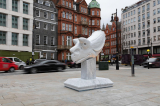
Twin bombings claimed by the Islamic State group hit Yemeni forces in Aden on Monday, killing at least 41 people in the latest of a spate of attacks in the southern city.
The attacks in Aden -- which is serving as the temporary government headquarters after rebels forced authorities from the capital -- follow a major military operation against jihadists in parts of southern and southeastern Yemen.
Backed by a Saudi-led coalition, forces loyal to President Abedrabbo Mansour Hadi are battling both Sunni extremists and Iran-backed Shiite rebels.
In the first attack, a suicide bomber killed 34 people queueing to enlist at a recruitment centre near the Badr base in Aden's Khormaksar district, said Brigadier General Nasser al-Sarei, the commander of Yemen's special security forces.
A subsequent explosion inside the base killed seven soldiers, he said.
In a statement posted online, IS said one of its fighters detonated an explosives belt among "apostate soldiers" at a recruitment centre, followed by the bombing at a gate of the Badr base.
The jihadist group, which has seized control of large parts of Syria and Iraq, also claimed responsibility Monday for a wave of bombings in Syrian coastal cities that killed more than 100 people.
A local resident in Aden described the scene of the Badr explosions as "horrible", saying body parts had been blown dozens of metres (yards) away.
"They came to complete the procedure of their recruitment and receive their first salary," he said, speaking of the young men who had gathered outside the army centre.
Abandoned slippers and sandals, apparently from the victims, covered the area, television footage showed.
Aden resident Ramzi al-Fadhli said "wailing filled the air" as women identified the remains of relatives at Al-Jumhuriyah Hospital, where at least 32 bodies were taken.
- Peace talks resume -
Aden has seen a wave of attacks in recent months claimed by Al-Qaeda or its jihadist rival IS after government forces drove Shiite Huthi rebels out of the port city in July with support from the Saudi-led coalition.
The coalition launched operations in Yemen in March last year after the rebels seized control of Sanaa and other parts of the country, forcing Hadi's government to flee the capital Sanaa.
Al-Qaeda -- which has a long presence in the Arabian Peninsula country -- and IS have exploited the power vacuum created by the conflict to expand their zones of control in the south and southeast.
Over the past two months, government and coalition forces have hit back, driving Al-Qaeda militants out of the Hadramawt provincial capital of Mukalla, which they had controlled for a year.
But attacks on security forces have left scores dead.
On May 1, four guards were killed in a bombing that targeted the convoy of Aden's police chief General Shallal Shayae, in the second such attack on him in a week.
Several attacks have also targeted troops in Hadramawt since government forces ended Al-Qaeda rule in Mukalla.
Earlier this month, 47 police were killed in a series of bombings near Mukalla.
UN-sponsored peace talks between the government and rebels resumed Monday in Kuwait after they had broken off a week ago.
The government had demanded a written pledge from the rebels and their allies recognising an April 2015 UN Security Council resolution calling for their withdrawal from the capital and other territories, as well as the legitimacy of Hadi.
Yemeni Foreign Minister Abdulmalek al-Mikhlafi said on Twitter Sunday that the government had agreed to give the peace talks a "last chance".
Fighting since the coalition intervention in March 2015 has killed more than 6,400 people, displaced about 2.8 million and left 82 percent of Yemen's population in need of aid, the United Nations says. afp









































